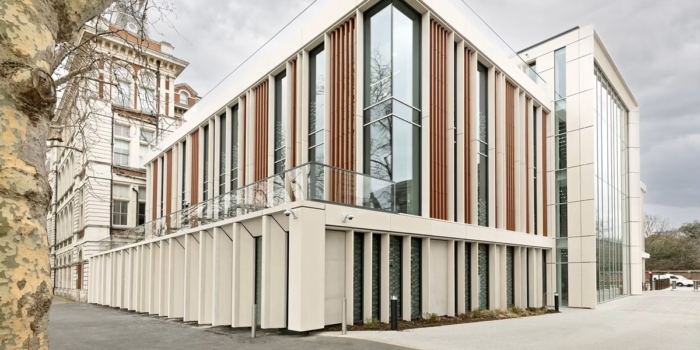 The EPC was honoured to welcome former Universities Minister the Rt Hon Chris Skidmore to delivered a speech as part of our 2021/22 Annual Congress on the theme of ‘A Better World’. This is the text of his speech.
The EPC was honoured to welcome former Universities Minister the Rt Hon Chris Skidmore to delivered a speech as part of our 2021/22 Annual Congress on the theme of ‘A Better World’. This is the text of his speech.
Thank you for the invitation to speak today.
I feel honoured, yet at the same time daunted, that as a historian, you have given me this platform of addressing this annual congress of Engineering Professors.
I must confess it is that same mixed feeling of guilt and shame, call it imposter syndrome if you like, that one feels as a Minister, speaking to any assembled gathering of experts in their field, who know far more than I could ever hope to know about both your respective discipline and its research, than I could even possibly conceive.
Yet while I may call from the arts and humanities side of the tracks, I have a long-held admiration for engineering, having broken an equally long-standing family tradition of becoming an engineer. My grandfather began his career at an early age at Rolls Royce in Filton, while my father followed him into British Aerospace, working on Concorde, before branching out into medical physics and obtaining his Physics doctorate in doppler ultrasound, establishing his own medical technology company and winning the Royal Academy of Engineering Silver Medal back in 2000.
As a result, I’ve witnessed first-hand the trials, frustrations, wrong turnings of a family small business working in R&D over the past four decades. I’ve seen and recognised the barriers that prevent research projects from ever getting off the ground.
Above all, I grew up recognising that engineering at its essence, was about problem solving— not merely the theoretical or the practical, but also the day to day reality of making things— whether a product or business— work.
Today, you have set me an enigma of a problem to solve. How can we ‘research for a better world’?
A better world is one which we all of course always strive for, indeed it has always been the goal of governments and societies past, but perhaps in my lifetime, the need for a better world brings with it more meaning and urgency than I can remember. It is the nature of the human condition to seek hope in despair, to look forwards and not backwards, and to find meaning out of times that can seem incomprehensible. So we find ourselves, as previous generations have done, seeking to ‘rebuild’, or in that phrase du jour, ‘build back better’.
In the wake of the pandemic, post-Covid recovery the almost the sole focus of governments, a mission that one could have scarcely understood 18 months ago when I was still Research Minister. The importance of research has been proven in spades by the pandemic. It has been our guiding light out of the tunnel.
Of course, the world still turns, hospitals and schools need to function, welfare needs to be provided, but while the pandemic continues to rage across the globe, we have yet to experience the aftershocks that it has caused, from economic recession and a GDP fall that has not been matched for centuries, a fall in educational achievement to a falling birth rate and its impact upon future society. These are problems that not just current politicians will have to grapple with, but I suspect future generations also, not least when we also will have to address the historic levels of debt and the yawning deficit that once again will hang around our economies, hindering their effectiveness to deliver economic growth and future prosperity.
In this new age, we need to recognise that priorities will change, as competing demands are made on more limited resources. Already we are witnessing calls for increased spending, at a time when a pathway to fiscal constraint will also need to be set. And with any competing demand, choices will need to be made. How those choices are chosen will be determined by the value, both in terms of economically but also to society, placed upon them by policy makers and governments.
The importance of research to our economy and society should have been proven in spades by the pandemic. It has been research that has proved to be our guiding light out of the tunnel. Vaccination programmes, antivirals and medication to tackle COVID has demonstrated how research not only transforms lives, it saves lives too. If there is one positive to be drawn from this dark past year, it has been the improved recognition that R&D matters.
Yet equally, scepticism to scientific advice, combined with anxieties over lockdown, has highlighted that the research community must always work to demonstrate impact, to take wider society and the general public with them. Narratives matter. How they are woven, out of the threads of people’s hopes and fears, facts and figures, stories and examples, determines how successful campaigns can be. And the need for more research will always be one long campaign that never ends.
Even before the pandemic broke, the government allied its own narrative of a post-Brexit Britain to the future facing, change making potential that R&D investment can bring, with its call to fashion the UK as a ‘global science superpower’. The commitment to spend 2.4% GDP by 2027 on R&D was of course made in the Industrial Strategy White Paper back in 2017, but the recent government commitment to double public R&D spending to £22billion by 2024/25 has certainly given the commitment a boost. I have spend considerable time already analysing how we might achieve the ‘Road to 2.4%’ in a 30,000 word lecture series I gave in 2019, and do not wish to repeat myself, though for me perhaps the most pressing fact I can relate today is that on 13 July, 2027 is just 2,000 days away.
This year’s Innovation strategy and the investment made in the Spending Review in R&D will be a critical indicator of whether we will reach the 2.4% target. Four years have so far past, with R&D activity having only risen around 0.2% of GDP in this period. With five and a half years to go, we cannot afford to continue on the same trajectory.
I have come to doubt whether 2.4% will be sufficient for the scale of change that is coming. Now is the time to double down, especially when we recognise where the rest of the world is heading. Even I have come to doubt whether 2.4%, the OECD average at the present time, will be sufficient for the scale of change that is coming in the 2020s and into the 2030s. Innovation rich countries are pulling ahead even further. The US and China are heading towards 3% GDP, Japan spends 3.2%, Germany is planning to reach 4%, South Korea is already at 4.5% and Israel higher still at 4.9%. Even the OECD average that was the benchmark for the 2.4% strategy has risen to probably over 2.6%.
The pandemic and other nations response to how to build economic recovery will only lead to a widening gap in R&D performance if we do not step up. “In order to win the 21st century economy” President Biden has stated, “America must get back to investing in the researchers, laboratories, and universities across our nation”. He is calling on Congress to make an $180 billion investment that will both advance U.S. leadership in critical technologies and upgrade America’s research infrastructure” and “establish the United States as a leader in climate science, innovation, and R&D”. Similar commitments marrying increased investment in innovation and technology with clean growth and combatting climate change are being made across Germany, South Korea, China and Singapore.
Nine years ago, I wrote a chapter in a book making the case that innovation should be placed at the centre of ‘Britannia Unchained’. The success of ‘Global Britain’ now depends on matching countries that have transformed their economies towards innovation and research. I would now go further— and suggest for the Innovation Strategy that a definite timetable is set for 3%, and beyond to 3.5%. To fail to achieve this over the next two decades will be setting ourselves up to fail.
Yet with any strategy, risk of simply being left behind as the world transitions its economies towards more modern, technological approaches in which R&D lies the centre, is not the only narrative that must be woven. At every stage, the threat of inaction or slow progress needs to be balanced with the positive, transformational, human message of why investment in R&D is so important, if the taxpayer and general public are to understand the importance of research. Important not only for companies who wish to remain agile and market dominant, important not only for new job creation, but why R&D is important to someone living in Hartlepool or Doncaster. It’s a question that I have continued to grapple with outside of government having agreed to co-chair the Higher Education Commission’s inquiry into levelling up research funding. For myself, I have long believed that investment in translational research conducted in places such as our catapult networks such as the Advanced Manufacturing Catapult is where change could be delivered: with a budget of under £250million a year, this is less than a tenth of what Germany spends on its Fraunhofer institutes. By combining additional investment with a commitment to work lower down the supply chain, and to ally skills programmes with new catapult centres, the impact that research can have creating new jobs at every skill level could be felt. People are, quite obviously, the life blood of R&D. It doesn’t matter how much money you invest, unless you have the capacity and capability to perform research, and to adapt and translate its potential.
Low level productivity and a skills deficit remain one of the greatest barriers to ‘levelling up’ across the country, which cannot be achieved by investment in capital alone. People are, quite obviously, the life blood of R&D. It doesn’t matter how much money you invest, unless you have the capacity and capability to perform research, and to adapt and translate its potential. And I’m not just talking about the 200,000 new jobs that will need to be created through the expansion of R&D activity, but the wider ecosystem and supply chain of jobs that are created through the application of new technologies or new materials.
We cannot divorce the activities of researchers from the wider skills pipeline that needs to be created if we are to meet 2.4%: skills training offers the best possible means to increase productivity, yet our SMEs and companies have some of the lowest in work training rates in the OECD. Those that fail to invest in skills are the same who fail to invest in R&D, for they rely on short-term gains and not realising long-term opportunity. Allied to investing in research— and with it our high skill level researchers— is the imperative that we invest in skills across the supply chain if diffusion, adaption and development is to succeed. It’s why I have decided to establish the Lifelong Education Commission with Res Publica, to highlight how training and lifelong skills investment is just as essential for economic transformation as R&D, indeed one cannot happen effectively without the other.
If we are to research for the better, ‘global science superpower’ narrative must be aligned with the ‘levelling up’ agenda if both are to truly succeed: the challenge for us all is joining both together in a way that demonstrates real change to the lives of people or SMEs who do not view R&D as something that either affects them, or they need to do.
Engineering has a rich heritage of translating complex and unfathomable ideas into reality. From the railways to the car, the history of flight, engineers have managed to transform individual lives by demonstrating how technological change can make people’s lives easier. Of course, this is where engineering has a rich heritage of translating complex and unfathomable ideas into reality. From the railways to the car, the history of flight, engineers have managed to transform individual lives by demonstrating how technological change can make people’s lives easier. The historian in me still believes we have much to learn from the role of engineering in the history of innovation, and what lessons we can still learn for today on how to achieve large scale systems changes needed for society.
The challenge we face, however, is how we make change just as convenient and comfortable as possible, when in areas such as climate change and the emissions reductions needed to achieve net zero, require transformations away from current technologies and behaviours that seem daunting.
But it can be done. Indeed it must be done. R&D into new, yet to exist technologies will have a critical role to play in achieving net zero, a target which I signed into law back in 2019. Yet equally if not more important is the impact that research into how we can better use existing technologies to achieve net zero. If 2021 will be dominated by any agreement reached at COP26 in Glasgow in November, it will have to be research that steps up to deliver on the greener future that will be required.
The issue for the UK’s R&D strategy comes when we move away from the clearly defined narratives of levelling up, building back better, or a green recovery. Mission orientated approaches towards specific goals and outcomes are helpful in supporting these narratives, shaping them and the financial investment needed to deliver upon them. But UK research has also led and shaped a better future by its discovery led nature, based on excellence. This cannot be left aside in the desire to create more challenge-based funding schemes. The creation of the Advanced Research and Invention Agency is a welcome one, but again this should not be viewed as an alternative to properly funding laboratory focused research across departments in our universities and research institutes, which will still be conducting perhaps 90% of existing R&D research.
I make this point, for if we are to research for a better future, it is worth reminding that this does not always necessarily mean we need to resort to novelty. Existing funding mechanisms such as QR are perhaps the best means by which to get R&D investment flowing so that it has maximum impact. I’ve seen first-hand also how QR can be used as the mortar to bind various funding streams together, so that organically, research projects can then flourish and attract further private R&D in turn. Equally, funding opportunities such as the Research Partnership Investment Fund or the Higher Education Innovation Fund are working, though I believe with the publication of the Knowledge Exchange Framework, they can be now harnessed to better qualitative data. We need not reinvent the wheel to move faster towards 2.4% or 3% … we just need to change the tyre.
One of the reasons I campaigned strongly also for association to Horizon Europe was along these same conservative principles, that we should seek to preserve and protect long cherished research partnerships that have been forged over many years. It is a philosophy perhaps best espoused by Michael Oakshott— ‘to prefer the tried to the untried, fact to mystery, the actual to the possible’. We need not reinvent the wheel to move faster towards 2.4% or 3% as I would suggest, we just need to change the tyre.
That said, I do believe that there is a case for fashioning a new compact for R&D between government, universities and our research institutes, one based not solely on increased investment, but on how that money is apportioned and how better research can be realised by engendering a better sense of trust within the system.
Far too often, too many researchers in both university and industry and chasing too many pots of grant funding, the total amount of which will last but a year if lucky before another funding cycle needs to be initiated. An hour wasted on form-filling, on meetings to agree who will conduct the assessment, to meet the demands and conditions of the grant, is potentially an hour of research wasted. The government has rightly instigated a Bureaucracy Review into existing processes, but I wonder if everyone would not be better served by moving towards a model of research funding like Horizon Europe, that has a multi-financial framework, a fixed seven year research programme.
For the government, such a single research fund might help to rationalise investments from discovery led research and ARIA at the apex, towards more translational and applied research at the base, with missions acting as funding streams. Setting a multi-annual budget would also allow for UKR&D activity to be more agile, to seize potential collaborative R&D activities with international partners, and to break free from the annual cycle of the R&D budget. And at the same time, a single research budget could be clearly communicable to the public and taxpayer, in the same way Horizon has been across Europe.
Perhaps you may view this as just too ambitious, though we should recognise that, as the pandemic has demonstrated and Net Zero will need to demonstrate in spades if it is to succeed, the horizontal structures of government and society need to be as strong as the vertical, to which a single budget commissioning research might be the answer.
Stability
Underlying the purpose of a single budget, and a multi-annual framework aligned to an agreed settlement, is perhaps the most important principle we need for research: stability. You all know the value that stability brings, and the threat to research that instability endangers. Grants are paused, revenue streams dry up, collaborations once possible move elsewhere. More than money can ever buy, stability lies at the heart of a successful R&D ecosystem. That is why it is so important that when considering any policy decision, and its potential to disrupt or delay, analysis is given to how this might impact upon research capacity.
To this I would like to add two further priorities for delivering better research: security and sustainability.
Security
Security of course has more than one connotation, both facing inwards and outwards. For the research community, research cannot be conducted effectively without the frameworks and agreements that underpin collaboration. The importance of intellectual property rights and other intangible assets is only growing, and if the UK is to maintain its leadership in these fields, we will need to seek out new means of securing new rights across digital domains and AI. Post-Brexit, we seriously need to address issues around UK IP rights and our relationship with the European Patent Office, but this should also point to a wider review of how the UK can lead on the debates around the future of copyright, trademarks and patents working with the World Intellectual Property Organisation.
The security of research that has the potential to fall into the hands of hostile agents needs to be guarded against too, which is why the creation of a new unit in BEIS to monitor threats to universities and research institutes is a welcome one. We should continue to seek collaborations across the globe, for research knows no boundaries, but this cannot come at the cost of compromising the value of research that has been funded by the taxpayer. Then there is the question of sovereignty when it comes to critical national infrastructure and assets. Debates around a UK GNSS system in space and UK independence will likely translate across to other new technologies in due course. Post-Brexit, there is a powerful narrative to be explored about how the UK, while working to strengthen its international collaboration in research, can at the same time increase and improve its independent manufacturing capacity in new technologies.
But security in research, for any researcher, is also about their job. Putting food on the table, looking after their family, scientists and researchers are human after all, even if it seems at times that they perform superhuman tasks. Academic precarity for early career researchers was an area of policy I sought to focus on when a Minister, highlighting the consequences of fixed term contracts and non disclosure agreements that undermined staff and their welfare. Never mind the so-called ‘brain drain’ across the Atlantic, we continue to lose too many excellent researchers from our universities, some who never return to work in R&D again. This is an unacceptable loss of talent, and an unacceptable loss of taxpayer investment in human capital that has been wasted due to lack of foresight. It’s why one of the last announcements I made was that the government should construct a People Strategy for research, to plan effectively how to retain researchers and not lose them through a lack of secure job opportunities.
Sustainability
To stability and security, I would also add sustainability. By that I don’t mean measuring sustainability by SDGs or in financial terms, though that is clearly important, but in sustaining the institutions through which R&D flows.
To return to that same Oakshottean principle, we should seek to conserve that which has worked, to recognise and respect the value that our existing universities and research institutes bring to Britain globally. This includes taking care not to threaten university R&D activity inadvertently. Ultimately, this would not happen if research costs were funded at full economic cost. To place research activity at the mercy of international student flows or any other cross-subsidisation seems a dangerous place, and perhaps ultimately unsustainable place, to be.
Universities and their research have been so outstanding at delivering on international sustainable development goals, turning their focus on how to improve societies across the globe, that sometimes they seem to have neglected their own sustainability. By this I don’t mean their financial sustainability, but the sustainability of their public image. I have campaigned for universities to recognise their value as civic institutions, to become anchor institutions in the towns and cities from which they take their name, if they are to retain wider public support.
There is so much untapped potential here, for universities to not only highlight their existing importance to their local and regional economies, but to consciously adopt new strategies of setting up walk in centres on local high streets, engaging seriously with future modular and course based provision, to demonstrate why they can be change makers locally as well as globally. Of course there is a wider role here for how all this is measured if it is to be managed, but the intent should come before the process. In an age of competing priorities, the more universities can do to expand their mission, the more likely they are to secure their future. As I have said previously, Red Wall universities can spearhead an educational and civic mission as impressive as the Red Brick universities had, if they are willing to look at how to do things differently, diversify and adapt. Sustainability can and should be local as much as global.
Call it the Plan Triple S, if you like, but these three words: stability, security and sustainability should underpin any research strategy for a better future. Between them they blend, I believe, the vital importance of retaining and conserving what the UK already does so well, with the potential to achieve even more, building on our successes.
For ultimately, if we want to research for a better world, we need better research.
Thank you.
Rt Hon Chris Skidmore MP

 The EPC was honoured to welcome former Universities Minister the Rt Hon Chris Skidmore to delivered a speech as part of our 2021/22 Annual Congress on the theme of ‘A Better World’. This is the text of his speech.
The EPC was honoured to welcome former Universities Minister the Rt Hon Chris Skidmore to delivered a speech as part of our 2021/22 Annual Congress on the theme of ‘A Better World’. This is the text of his speech.


